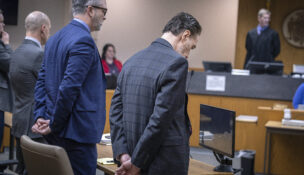State picks remedy for defective complaint
By: dmc-admin//October 22, 2003//
A defendant convicted of both the charge of repeated acts of sexual assault, contrary to sec. 948.025, and individual acts of sexual assault, does not get to choose which of the charges must be vacated, the Wisconsin Court of Appeals held on Oct. 15.
On Aug. 27, 1999, the State charged John S. Cooper with two counts of repeated sexual assault of a child, J.L., contrary to sec. 948.025(1). Count one covered events that occurred between Jan. 1 and Oct. 14, 1997, and count two covered events that occurred between Oct. 1, 1998, and Jan. 25, 1999.
On Feb. 25, 2000, the State filed a second complaint charging Cooper with three counts of first-degree sexual assault of a child and one count of intimidating a victim, contrary to secs. 948.02(1) and 940.45(3), respectively. All of these events occurred between Oct. 1, 1998, and Jan. 25, 1999, and involved the same victim as was involved in count two of the first complaint.
Cooper filed a motion to join all six of the charges for trial and Waukesha County Circuit Court Judge J. Mac Davis granted his motion. Cooper was found guilty by a jury on all except the first count.
Cooper then moved for postconviction relief, arguing that his convictions on the three counts of first-degree sexual assault of a child were illegal in light of his conviction on the second count of repeated acts of sexual assault of a child, because all those charges involved the same child and the same time period.
Judge James R. Kieffer, to whom the case had been transferred, agreed that the joint trial of both the underlying acts and the repeated acts count violated sec. 948.025(3). However, he vacated the repeated acts count, rather than the three individual acts counts. Cooper appealed, but the court of appeals affirmed in a decision by Judge Harry G. Snyder.
The Statute
Section 948.025(3) provides in relevant part: “The state may not charge in the same action a defendant with a violation of this section and with a felony violation involving the same child … unless the other violation occurred outside of the time period applicable under sub. (1).”
|
What the court held Case: State of Wisconsin v. John S. Cooper, Nos. 02-2247-CR & 02-2248-CR. Issue: When a defendant is improperly charged in the same action with individual acts of sexual assault of a child, and repeated acts of sexual assault, and the jury finds him guilty of all counts, what is the remedy? Holding: Either the individual acts, or the repeated acts count, must be vacated, and it is the State that chooses which will remain. |
The court agreed with Cooper that, pursuant to the statute, the consolidation of the charges into the same action was unlawful. However, it rejected his argument that, once the first action was commenced, the State was bound to the charge of repeated acts under sec. 948.025(1), and therefore the subsequent charges for specific acts of sexual assault were prohibited and must be vacated.
Persuasive Authority
Finding no Wisconsin precedent, the court took guidance from recent cases interpreting a California statute that also prohibits charging continuous sexual abuse and specific sex offenses in the same action.
In People v. Alvarez, 122 Cal.Rptr. 2d 859, 861 (Cal.Ct.App. 2002), the defendant, like Cooper, argued that the original charge of continuous acts barred the prosecution of subsequently charged specific acts involving the same victim and the same time period.
The California court disagreed, stating, “The conclusion we reach is consistent with, and fosters, the apparent legislative purpose of [Cal. Penal Code] section 288.5, which ‘was enacted because of problems of proof that can arise where the molester resides in the same house as the child. Under such circumstances the child may recall she was molested repeatedly over a period of time, but may not be able to recall discrete instances with sufficient precision to prove multiple counts….’ It would be anomalous if section 288.5, adopted to prevent child molesters from evading conviction, could be used by those molesters to circumvent multiple convictions with more severe penalties[.]” Alvarez, 122 Cal.Rptr. 2d at 863-64.
A second California case, People v. Torres, 126 Cal.Rptr. 2d 92, 96 (Cal.Ct.App. 2002), also held that, because the specific felony offenses carried a more substantial aggregate sentence and were “most commensurate with [the defendant’s] culpability,” the p
roper remedy was to reverse the conviction for continuous acts instead of those for specific offenses.
Agreeing with the reasoning of the California courts, the Wisconsin court of appeals held, “Nothing on the face of the Wisconsin statute requires us to favor charges filed first in time, and Cooper has not demonstrated why such an interpretation would further the interests of justice. The State originally brought two distinct actions against Cooper, alleging two distinct sets of facts to support the allegations. … Because of the distinct facts underlying the separate counts, Cooper was charged but once for each crime or series of crimes. Had the actions remained separate, the convictions on all four counts would have survived a challenge under sec. 948.025(3).”
The court further concluded that, even if there was error, judicial estoppel would bar the relief Cooper sought, because it was he who moved to consolidate the charges.
Guidance
| |
||
|
Links Related Article |
||
| |
||
Issuing guidance for future cases, the court continued, “We hold that a court may reverse a conviction on the repeated acts charge under Wis. Stat. sec. 948.025(1) when the proscription against multiple charges in sec. 948.025(3) is violated. This remedy is proper even where the repeated acts charge was filed prior to an action for specific acts of sexual assault under Wis. Stat. sec. 948.02(1). Prosecutors should engage in charging practices that avoid violations of sec. 948.025(3). When necessary, the trial court should address such violations at the time of consolidation rather than during or after trial. If a violation of sec. 948.025(3) does arise, the State should choose which charge or charges it will pursue.”
The court also rejected a double jeopardy challenge by Cooper, because the vacation of the repeated acts count rendered the issue moot, and various ineffective assistance of counsel claims.
Unpublished Opinions
As a final matter, the court sanctioned Cooper’s counsel for making multiple citations to unpublished opinions, contrary to Rule 809.23(3). The court found, “Cooper’s appellate counsel attempts to minimize his culpability by locating such citations in footnotes and providing the disclaimer that citations to unpublished decisions are ‘for information and illustrative purposes only.’ His use of the unpublished opinions to support his argument, however, reveals his intent to persuade this court with the improper citations.”
Calling the citations “blatant disregard” of the appellate rules, the court imposed a fine of $50 for each of the nine citations, for a total of $450.
Click here for Case Analysis.
David Ziemer can be reached by email.
Legal News
- FBI launches criminal investigation into Key Bridge collapse
- Man charged in slaying after woman’s leg found at Milwaukee-area park
- Minnesota man guilty in fatal stabbing of teen on Wisconsin river, jury finds
- Wisconsin teen sentenced in bonfire explosion that burned at least 17
- Wisconsin man who broke into home, ate victim’s chicken, slept in victim’s bed, receives prison and jail sentences
- Judge refuses to dismiss Hunter Biden’s gun case
- House passes reauthorization of key US surveillance program after days of upheaval over changes
- Milwaukee Police officer traveling to Georgia training retires before facing discipline
- Evers to ask legislature to approve largest increase in state support for UW System in two decades
- 7th Circuit Court of Appeals proposes new rules
- Federal agencies allege toxic work environment for women in new report
- Wisconsin man sentenced for sex trafficking a woman and a minor online
WLJ People
- Power 30 Personal Injury Attorneys – Russell Nicolet
- Power 30 Personal Injury Attorneys – Benjamin Nicolet
- Power 30 Personal Injury Attorneys – Dustin T. Woehl
- Power 30 Personal Injury Attorneys – Katherine Metzger
- Power 30 Personal Injury Attorneys – Joseph Ryan
- Power 30 Personal Injury Attorneys – James M. Ryan
- Power 30 Personal Injury Attorneys – Dana Wachs
- Power 30 Personal Injury Attorneys – Mark L. Thomsen
- Power 30 Personal Injury Attorneys – Matthew Lein
- Power 30 Personal Injury Attorneys – Jeffrey A. Pitman
- Power 30 Personal Injury Attorneys – William Pemberton
- Power 30 Personal Injury Attorneys – Howard S. Sicula











